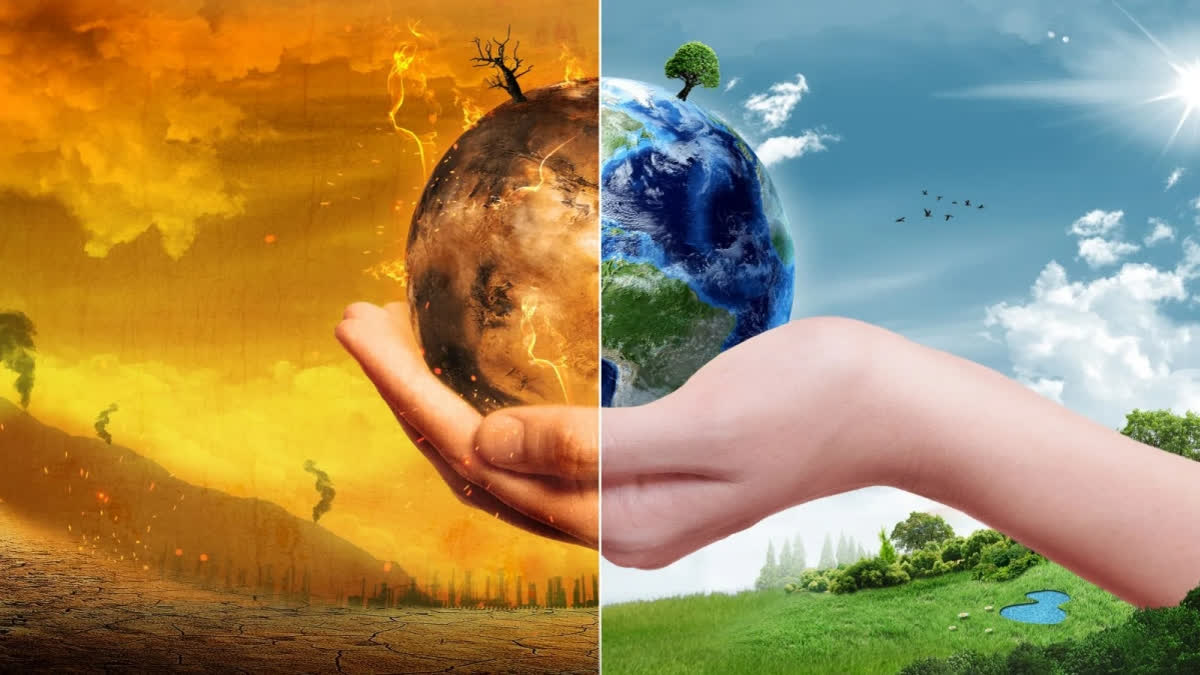New Delhi:As Delhi grappled with severe air pollution with AQI reaching 288 on Friday, December 13, a larger concern which has a bearing on sustenance surfaced. Indian cities are becoming increasingly vulnerable due to the economic impacts induced by climate change.
On Thursday, December 12, the AQI, which ranges from 0 to 500, was 270 at 11 am, rising to 273 by 12 pm, 286 by 3 pm, and 296 by 8 pm. On Thursday, the average AQI was 288, indicating 'bad', compared to 'moderate' 199 the previous day.
From heatwaves and rising sea levels to storms and urban flooding, these environmental challenges are not just threatening lives but also straining the economic backbone of urban India.
With urbanisation accelerating at an unprecedented rate, the risks posed by climate change require immediate attention. The economic fallout is no longer a distant possibility but an unfolding reality that demands sustainable growth strategies, stronger infrastructure, and better urban planning.
The Growing Economic Toll on Cities
Indian cities, particularly metros such as Delhi, Mumbai, and Kolkata, are already feeling the heat. Extreme weather events like heatwaves, cold waves, and storms not only disrupt daily life but also impact critical sectors such as agriculture, transportation, logistics, and construction.
Economist Sharad Kohli elaborated on the issue, saying, "If we talk about the climatic impact on metro cities, take Delhi, for example. Extreme heatwaves, touching 50°C in summers, and cold waves in winter disrupt normal life and logistics. The smog in October and November halts economic activity by delaying the movement of goods and vehicles. Similarly, Mumbai, being a coastal city, faces frequent flooding and heavy rains, which disrupt traffic, damage infrastructure, and affect freshwater supplies due to saltwater intrusion. These recurring disruptions impact workforce productivity, supply chains, and overall economic efficiency.”
The situation is no better for Kolkata, where extreme storms and cyclones are becoming common. Surrounding agricultural areas, vital to the city’s economy, face severe losses due to erratic weather patterns. Kohli noted that such events amplify economic losses in terms of labour productivity, property damage, and agriculture yields, affecting the overall economic health of urban India.
Rising Costs of Climate Change
Indian cities are urbanising at an extraordinary rate, with the urban population expected to reach 871 million by 2050, according to the United Nations. However, this rapid growth exposes them to more severe climate-related risks. Poor urban planning exacerbates the situation, leaving cities ill-equipped to handle heat island effects, flooding, or rising sea levels.
For instance, Mumbai, Kolkata, and Chennai are directly threatened by rising sea levels. When Cyclone Amphan hit the Sundarbans in 2020, it caused widespread damage in Kolkata and surrounding areas. The storm surge reached 14.8 feet, devastating crops, homes, and infrastructure. Economically, such events deplete resources, halt trade, and divert funds meant for development into emergency relief.
Impact on Public Health and Infrastructure
Extreme weather impacts urban health, infrastructure, and productivity. The combination of high temperatures and humidity, measured as the Wet Bulb Globe Temperature (WBGT), has already reached dangerous levels in Delhi, Kolkata, and Mumbai. Prolonged exposure to such conditions strains human resilience and reduces workforce efficiency. This, in turn, affects economic productivity, particularly in labour-intensive sectors like construction and agriculture.
Professor Seema Sharma, an economist from IIT Delhi, emphasised, “Cities like Mumbai and Kolkata face severe risks from rising sea levels and storms, which could cripple basic infrastructure. Floods and cyclones disrupt public transport, water supplies, and power systems, leading to public crises and massive economic losses. It is crucial to prioritise green technologies and transition to sustainable practices to mitigate these impacts.”
She added saying while short-term measures like carbon trading can help, long-term solutions require global cooperation and policy shifts. "Public-private partnerships, coupled with incentives for businesses, could pave the way for a sustainable transition. The corporate sector must also recognise that their survival depends on addressing these challenges,” she added.
Sectoral Impacts: Agriculture, Logistics, and Beyond
Climate change has far-reaching implications for various economic sectors.
